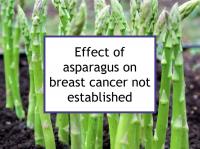Like onions and garlic, asparagus (Asparagus officinalis) is a member of the lily family. Asparagus is a dietary source of asparagine, folate, quercetin, beta-carotene, rutin, vitamin K, and fiber. Asparagus also contains some capsanthin, glutathione, lutein, ferulic acid, and various saponins, most of which have been reported to have anti-cancer properties.
Asparagus has been shown to have antioxidant, mutagenic, cholesterol lowering and diuretic properties, as well as to protect the liver from toxic insults such as alcohol. Asparagus saponins have been shown reduce growth and induce apoptosis in human leukemia, liver, gastric and colon cancer cells in the laboratory.
Breast cancer-related effects of eating asparagus
Diosgenin, an asparagus steroidal saponin also found in fenugreek and yams, has been shown to inhibit tumor growth in both estrogen positive (ER+) and estrogen negative (ER-) breast cancer tumors implanted in mice. Diosgenin has also been found to preferentially inhibit proliferation and induce apoptosis in HER2+ cancer cells in the laboratory.
Another asparagus saponin, protodioscin, has been found to have cytotoxic activities against a variety of cancer cell lines, including ER- human breast cancer cells. In addition, asparagus component rutin has been reported to reduce the cardiotoxic effects of doxorubicin.
Quercetin has been reported to increase the effectiveness of doxorubicin, paclitaxel, and 5-fluorouracil (5-FU) chemotherapy in ER+/PR+ breast cancer cells. Quercetin has also been shown to inhibit aromatase, thereby supporting anti-estrogen treatment. In addition, quercetin has been found to inhibit the migration and adhesion of triple negative (ER-/PR-/HER2-) breast cancer cells and to significantly inhibit tumor progression in a mouse model of triple negative breast cancer. Quercetin has also been shown to enhance the anti-tumor activity of cisplatin while reducing it's adverse side effects.
Additional comments
White asparagus, also known as spargel, is grown away from light to inhibit the development of chlorophyll. Purple asparagus, which normally is much smaller than green or white asparagus, incorporates anthocyanins, which have been shown to have anti-cancer properties.
A number of supplements based on asparagus or related plants such as Chinese asparagus (Asparagus cochinchinensis), or based on various saponins, are available. Diosgenin is sometimes marketed as "natural progesterone." Protodioscin has been shown to increase the level of DHEA and testosterone in men. Unfortunately, their efficacy, safety and appropriate dosages have not been established in clinical studies and we would not recommend them.
Sources of information provided in this webpage
The information above, which is updated continually as new research becomes available, has been developed based solely on the results of academic studies. Clicking on any of the underlined terms will take you to its tag or webpage, which contain more extensive information.
Below are links to 20 recent studies concerning this food and its components. For a more complete list of studies, please click on asparagus.
